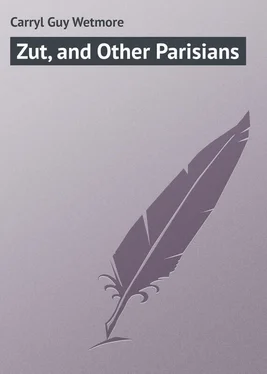Guy Carryl - Zut, and Other Parisians
Здесь есть возможность читать онлайн «Guy Carryl - Zut, and Other Parisians» — ознакомительный отрывок электронной книги совершенно бесплатно, а после прочтения отрывка купить полную версию. В некоторых случаях можно слушать аудио, скачать через торрент в формате fb2 и присутствует краткое содержание. Жанр: foreign_prose, на английском языке. Описание произведения, (предисловие) а так же отзывы посетителей доступны на портале библиотеки ЛибКат.
- Название:Zut, and Other Parisians
- Автор:
- Жанр:
- Год:неизвестен
- ISBN:нет данных
- Рейтинг книги:4 / 5. Голосов: 1
-
Избранное:Добавить в избранное
- Отзывы:
-
Ваша оценка:
- 80
- 1
- 2
- 3
- 4
- 5
Zut, and Other Parisians: краткое содержание, описание и аннотация
Предлагаем к чтению аннотацию, описание, краткое содержание или предисловие (зависит от того, что написал сам автор книги «Zut, and Other Parisians»). Если вы не нашли необходимую информацию о книге — напишите в комментариях, мы постараемся отыскать её.
Zut, and Other Parisians — читать онлайн ознакомительный отрывок
Ниже представлен текст книги, разбитый по страницам. Система сохранения места последней прочитанной страницы, позволяет с удобством читать онлайн бесплатно книгу «Zut, and Other Parisians», без необходимости каждый раз заново искать на чём Вы остановились. Поставьте закладку, и сможете в любой момент перейти на страницу, на которой закончили чтение.
Интервал:
Закладка:
"But no! But no!" said Caffiard hurriedly. And meant it.
At this point Pierre wrapped five two-sou pieces in a bit of paper, and tossed them, out of a little window across the hallway, to a street-singer whimpering in the court below. Pierre said that they weighed down his pockets. They were in the way, the clumsy doublins, said wonderful, spendthrift Pierre!
For the wide sky of the Quartier is forever dotted with little clouds, scudding, scudding, all day long. And when one of these passes across the sun, there is a sudden chill in the air, and one walks for a time in shadow, though the comrade over there, across the way, is still in the warm and golden glow. But when the sun has shouldered the little cloud aside again, ah, that is when life is good to live, and goes gayly, to the tinkle of glasses and the ripple of laughter, and the ring of silver bits. And when the street-singer in the court receives upon his head a little parcel of coppers that are too heavy for the pocket, and smiles to himself, who knows but what he understands?
For what is also true of the Quartier is this – that, in sunshine or shadow, one finds a soft little hand clasping his, firm, warm, encouraging and kindly, and hears a gay little voice that, in foul weather, chatters of the bright hours which it is so sweet to remember, and, in fair, says never a word of the storms which it is so easy to forget!
The veriest bat might have foreseen the end, when once Mimi had put her arm around the neck of Caffiard. Before the deus ex machina knew what he was about, he found his army of objections routed, horse, foot, and dragoons, and had promised to be at the gare St. Lazare at eleven the following morning.
And what a morning it was! Surely the bon Dieu must have loved Mimi an atom better than other mortals, for in the blue-black crucible of the night he fashioned a day as clear and glowing as a great jewel, and set it, blazing with warm light and vivid color, foremost in the diadem of the year. And it was something to see Mimi at the carriage window, with Pierre at her side and her left hand in his, and in her right a huge bouquet – Caffiard's contribution – while the deus ex machina himself, breathing like a happy hippopotamus, beamed upon the pair from the opposite corner. So the train slipped past the fortifications, swung through a trim suburb, slid smoothly out into the open country. It was a Wednesday, and there was no holiday crowd to incommode them. They had the compartment to themselves; and the half hour flew like six minutes, said Mimi, when at last they came to a shuddering standstill, and two guards hastened along the platform in opposite directions, one droning "Poiss-y-y-y-y!" and the other shouting "Poiss'! Poiss'! Poiss'!" as if he had been sneezing. It was an undertaking to get Caffiard out of the carriage, just as it had been to get him in. But finally it was accomplished, a whistle trilled from somewhere as if it had been a bird, another wailed like a stepped-on kitten, the locomotive squealed triumphantly, and the next minute the trio were alone in their glory.
It was a day that Caffiard never forgot. They breakfasted at once, so as to have a longer afternoon. Mimi was guide and commander-in-chief, as having been to the Esturgeon before, so the table was set upon the terrasse overlooking the Seine, and there were radishes, and little individual omelettes, and a famous matelote, which Monsieur Jarry himself served with the air of a Lucullus, and, finally, a great dish of quatre saisons, and, for each of the party, a squat brown pot of fresh cream. And, moreover, no ordinaire, but St. Emilion, if you please, with a tin-foil cap which had to be removed before one could draw the cork, and a bottle of Source Badoit as well. And Caffiard, who had dined with the Russian Ambassador on Monday and breakfasted with the Nuncio on Tuesday, and been egregiously displeased with the fare in both instances, consumed an unprecedented quantity of matelote, and went back to radishes after he had eaten his strawberries and cream: while, to cap the climax, Pierre paid the addition with a louis, – and gave all the change as a tip! But it was unheard-of!
Afterwards they engaged a boat, and, with much alarm on the part of Mimi, and satirical comment from Caffiard, and severe admonitions to prudence by Pierre, pushed out into the stream and headed for Villennes, to the enormous edification of three small boys, who hung precariously over the railing of the terrace above them, and called Caffiard a captive balloon.
They made the three kilometres at a snail's pace, allowing the boat to drift with the current for an hour at a time, and, now and again creeping in under the willows at the water's edge until they were wholly hidden from view, and the voice of Mimi singing was as that of some river nixie invisible to mortal eyes. She sang "Bonsoir, Madame la Lune," so sweetly and so sadly that Caffiard was moved to tears. It was her favorite song, because – oh, because it was about Pierrot! And her own Pierrot responded with a gay soldier ballad, a chanson de route which he had picked up at the Noctambules; and even Caffiard sang – a ridiculous ditty it was, which scored the English and went to a rollicking air. They all shouted the refrain, convulsed with merriment at the drollery of the sound: —
"Qu'est ce qui quitte ses père et mère
Afin de s'en aller
S'faire taper dans le nez?
C'est le soldat d'Angleterre!
Dou-gle-di-gle-dum!
Avec les ba-a-a-alles dum-dum!"
Caffiard was to leave them at Villennes after they should have taken their apéritifs. They protested, stormed at him, scolded and cajoled by turns, and called him a score of fantastic names – for by this time they knew him intimately – as they sat in Monsieur Bodin's arbor and sipped amer-menthe, but all in vain. Pierre had Mimi's hand, as always, and he had kissed her a half-hundred times in the course of the afternoon. Mimi had a way of shaking her hair out of her eyes with a curious little backward jerk of her head when Pierre kissed her, and then looking at him seriously, seriously, but smiling when he caught her at it. Caffiard liked that. And Pierre had a trick of turning, as if to ask Mimi's opinion, or divine even her unspoken wishes whenever a question came up for decision – a choice of food or drink, or direction, or what-not. And Caffiard liked that .
He looked across the table at them now, dreamily, through his cigarette smoke.
"Pierrot," he said, after he had persuaded them to let him depart in peace when the train should be due, – "Pierrot. Yes, that is it. You, with your garret, and your painting, and your songs, and your black, black sadness at one moment, and your laughter the next, and, above all, your Pierrette, your bon-bon of a Pierrette: – you are Pierrot, the spirit of Paris in powder and white muslin! Eigho! my children, what a thing it is, la belle jeunesse! Tiens! you have given me a taste of it to-day, and I thank you. I thought I had forgotten. But no, one never forgets. It all comes back, – youth, and strength, and beauty, love, and music, and laughter, – but only like a breath upon a mirror, my children, only like a wind-ripple on a pool; for I am an old man."
He paused, looking up at the vine-leaves on the trellis-roof, and murmured a few words of Mimi's song: —
"Pierrette en songe va venir me voir:
Bonsoir, madame la lune!"
Then his eyes came back to her face.
"I must be off," he said. "Why, what hast thou, little one? There are tears in those two stars!"
"C'est vrai?" asked Mimi, smiling at him and then at Pierre, and brushing her hand across her eyes, "c'est vrai? Well then, they are gone as quickly as they came. Voilà! Without his tears Pierrot is not Pierrot, and without Pierrot" —
Читать дальшеИнтервал:
Закладка:
Похожие книги на «Zut, and Other Parisians»
Представляем Вашему вниманию похожие книги на «Zut, and Other Parisians» списком для выбора. Мы отобрали схожую по названию и смыслу литературу в надежде предоставить читателям больше вариантов отыскать новые, интересные, ещё непрочитанные произведения.
Обсуждение, отзывы о книге «Zut, and Other Parisians» и просто собственные мнения читателей. Оставьте ваши комментарии, напишите, что Вы думаете о произведении, его смысле или главных героях. Укажите что конкретно понравилось, а что нет, и почему Вы так считаете.












